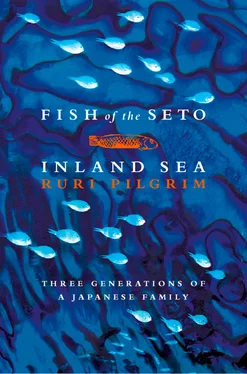1 ...6 7 8 10 11 12 ...20 âAll right, you can come.â Haruko stopped walking. She tidied Shuichiâs kimono and tied his sash tight. She held his hand and started off on the path between the rice paddies.
They saw Matabei coming back from shopping.
He asked, âOh, Haruko ojosama and Sachiko ojosama, Shuichi dansama, as well? And where are you going?â
Sachiko said, âJust over there.â She was quicker at tact than Haruko.
âOver there?â Matabei bent his head on one side and looked at the girls. âDonât be too long, ojosama,â he said.
âOh, no, weâll be back very soon,â Sachiko said.
They started to run. Matabei stood with a pole over his shoulder, shopping dangling from both ends. He looked after them for a minute, then went home, taking steps in rhythm with the movement of the pliable pole.
When they arrived in the little town with one narrow street, the sun had gone farther down and one side of the street was almost in darkness. At the back of a small shop which sold an assortment of stationery, sweets and haberdashery, there was a large persimmon tree laden with red fruit. The persimmons were shining in the evening sun.
The shopkeeperâs wife came out, wiping her hands on her apron, and opened her eyes wide in surprise.
âOh, Shuichi dansama, and Haruko ojosama and Sachiko ojosama, that was a long way to come.â
They did not know that they had to pay for the notebook but the woman did not worry about it either. She knew she would be paid later. When they said, âThank you,â and went out, she called after them, âGo home quickly. The autumn sun sinks very fast.â
âI want to go home,â Shuichi said. He must have been tired. It was getting dark rapidly and Haruko and Sachiko, too, were homesick. The worry of being scolded began to seem real as well.
âI am hungry,â Shuichi said. Haruko and Sachiko also felt hungry.
âLetâs take the railway track,â Sachiko suggested. The idea had crossed Harukoâs mind. If they took the railway track, it would take only about half an hour to get home, but they had been told by Tei-ichi many times that they must not walk on it. Even for Hideto, whose activities were hardly restricted at all, the railroad was an exception.
âI want to go home,â Shuichi repeated, holding Harukoâs hand. Haruko made up her mind.
They jumped from one sleeper to the next, and sang songs. There were lots of lovely pebbles to collect. They came to a railway bridge. They squatted and looked through the railings. Far below, the Kitaka river was heard, but the water was dark. Their village, Kitani, was along the river, a little upstream. It was the familiar river where they swam in summer when they thought no adults were around.
Home was not far away. They could get off the railway soon after the bridge and, within ten minutes, reach the big gate.
Haruko was relieved and astounded almost at the same time. She heard the tooting of a train and, as she looked, a light was approaching rapidly.
âSachiko san, sit here.â Her voice was harsh in her anxiety. âAnd Shu-chan next to Sachiko san.â
The thought which flashed through Harukoâs mind was that Shuichi should not die. She had promised her father to look after him. How her mother would cry if she lost Shuichi.
She pushed herself against the railings and told Sachiko and Shuichi to do the same. She reached behind Sachikoâs back to hold Shuichi across his shoulders. The train might kill her. She hoped that Sachiko would be safe, though she might be killed as well. But Shuichi would be protected if there were two people shielding him. He had to be saved.
Now she prayed, âPlease, God, I am sorry I did not listen to Rev. Kondo. Please help Shu chan for okahsanâs sake.â
It did not take long for the train to pass, thundering by.
âShu dansama, Haruko ojosama, Sachiko ojosama.â They saw a lantern and heard Matabeiâs voice. A tenant farmer had told Matabei that he had seen three children walking on the railway track.
Tei-ichi had heard from Matabei how Haruko was sitting with the other two, protecting them.
âHaruko, were you not afraid yourself ?â Tei-ichi asked. He was unexpectedly gentle.
âYes, but I thought it would be all right if Shu-chan was saved. Okahsan wonât cry.â As far as she could remember, Haruko had not been afraid. She had been too busy trying to save Shuichi.
Tei-ichi was silent. Haruko was surprised that she was not locked up in the storehouse. Her grandfatherâs eyes were a little moist. That surprised her as well. After sitting there for a while, Tei-ichi said, âLetâs go and have supper.â
By the time Haruko was ten years old, Shobeiâs fears about Rinji had been confirmed. It was well known that Tetsuâs father was losing his business to another stonemason in the next village as he had taken to drinking. His son, Tetsuâs brother, had never been promising. The family debt was accumulating. People gossiped that his daughterâs marriage into a rich family had turned the stonemasonâs head.
âPerhaps we should divorce her,â Shobei muttered in front of his wife. âShe has no children. We could send her home. We can give her some money ...â
It was the duty of a bride to bear children for the family she married into. The Miwas had a right to divorce Tetsu. It occurred to Shobei that the Chinese characters for âbarren womanâ were âstoneâ and âwomanâ, but his sense of decency restrained him from making a poor joke in front of his wife.
âTo send Tetsu home might be a solution,â his wife said, âbut you will not be popular. Even if you gave her money, her relatives would bear a grudge against you, and they are not a small family. It will not be good for Shuichiâs future.â
That was true. The little boy would need as much sympathy and help as possible as he grew up. In this part of the country, where tangerines grew in the winter sun, everything was easy-going, and a peasantsâ uprising was unlikely. But society was changing. The Socialist Party had been launched and the Peopleâs Newspaper was in circulation. There were strikes in the factories and mines. Shobei was afraid that when Shuichi grew up, the life of a landowner would not be as easy as it had been.
It was not just the material side of life that was under threat. Although Shobei himself was not directly involved in politics, he was recognised as one of the most powerful men in the area. Officials came from the local government to ask his opinion. Candidates for any government office were said to have to get his unofficial approval as the first step. For a person in such a position, a scandal about a member of his household being treated unkindly had to be avoided.
Shobei said to his wife, âYou are thoughtful. If you have a suggestion, say it.â It was the first time he had asked his wifeâs opinion on a weighty matter since they had married a long time ago.
âI think you should pay Tetsuâs fatherâs debt. It could not be too large for you. If the problem is drinking, the chances are that he will not be able to go back to his business. Pension him off. Then, make Haruko the rightful successor to Rinji san. No one will say you are cruel.â
Shobei folded his arms. He was not reflecting on what his wife had just said. He was simply impressed.
The duty of telling Haruko about the adoption fell on Tei-ichi.
âYou know your Rinji ojisan and Tetsu obasan, donât you?â Tei-ichi began.
Haruko had never seen her uncle except at formal family gatherings. The furtiveness of his demeanour as he talked to elderly relatives was plain even to the children. Beside Shintaro he had always been an undistinguished son and a mediocre brother. For the children, he had never been a respected uncle nor a friend.
Читать дальше












